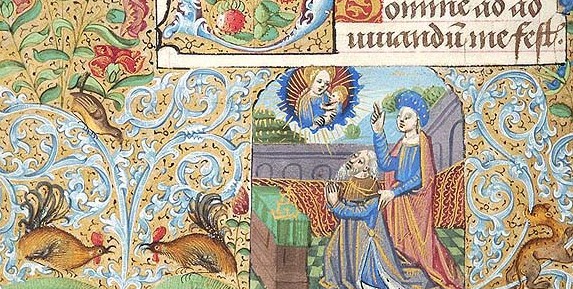Cow – Beef
Calf – Veal
Pig – Pork
Deer – Venison
Sheep – Mutton
Chicken – Chicken
Not hard to spot the odd one out, eh? Forgetting about chicken for a moment, have you ever noticed that in English, we have special names for the most-commonly consumed meats, separate from the names of the animals themselves? Most other languages are content to use the same word for the animal and its meat, so why not English? Before looking at the answer, here’s a clue in the form of the English names for animals with their French counterparts:
Bullock – boeuf
Calf – veau
Pig – porc
Deer – cerf
Sheep – mouton
Chicken – poulet
Apart from deer and chicken, you can see a strong similarity between French words for animals and the English words for the respective animal’s meat. The reason for this is the fact that between the 11th and 14th centuries, French was the language of the court in Great Britain, and of the upper classes. Peasants, who raised and slaughtered the animals, used the Germanic-inspired Middle English words for these animals, and our modern words for these animals are derived from them.
Royalty and the aristocracy, however, usually only encountered these animals as meat, and were the only ones able to afford to eat such meat regularly. Therefore the French words for these animals came to be used in English to refer to their meat. Note how this doesn’t apply to animals not normally eaten in Britain: e.g. horseflesh, dogmeat etc. As the elites didn’t eat these animals, normally, their French names didn’t become associated with their meat.
What about venison and chicken then? Well, venison didn’t use to mean only deer meat. It comes from the Old French word venesoun, meaning meat of large game, which could be deer or boar, which were hunted frequently. I imagine that as wild boars became less common in Britain, deer became the main quarry of hunters, and deer meat became synonymous with venison. And the reason we say chicken instead of poulet or pollet or somesuch is because it was widely available to both rich and poor, and the Middle-English speaking commoners vastly outnumbered the French-speaking aristocracy.
And that’s why I like chicken: it’s a symbol of the power of the people. The rich and powerful have always had a disproportionate influence on the world based on their numbers. This goes for language too, but still, numbers ultimately win the day, and if the majority of people use a certain word, then that word gets to go in the dictionary. So while chicken might not have the same delicious flavour as a good steak, this humble bird gave its life again and again to the masses, so that they could survive the harsh medieval life, and because of that we use its humble, everyday Middle English name: chicken.


Interestingly, English gets the word “pullet” (referring to a hen less than a year old) from the French “poulet.”
LikeLiked by 1 person
That’s right, maybe it was considered more of a delicacy because of its age (like veal or lamb) and was therefore only available to the French-speaking elites.
LikeLike
Very interesting and unique point. BUT almost you have persuaded me to be a vegetarian.
LikeLiked by 1 person
I feel the same way when I talk about non-traditional meats, or even when I use the word “meat” too often. It’s such an unattractive word.
LikeLike
I assumed chicken was a luxury meat until the 20th century, when battery farming made it cheap. Eggs were a cheap form of protein, but killing your egg-layer was an expensive act.
There are old recipes for “mock chicken”, which was pork or some other meat disguised as chicken; they wouldn’t have done that unless chicken was considerably more expensive than the meat being disguised.
LikeLiked by 1 person
That’s interesting, I must look into the history of chicken rearing. It’s hard to imagine passing pork off as chicken nowadays!
LikeLike
[…] and came into English in medieval times when French and Latin were fairly widely used in Britain in elite circles. People were therefore exposed to correct French and Latin regularly, and when expressions from […]
LikeLike
[…] of dried fruit and spices, and pretty soon, these ingredients were being used alongside meat like lamb, beef, and mutton in Christmas […]
LikeLike
[…] have seemed so odd at the time when French was in widespread use throughout Europe, and in use in elite circles in English-speaking countries. Plus, the grammar of Old English was much more inflected than modern […]
LikeLike
Don’t we also use “poultry” to mean chicken, etc. though?
LikeLiked by 1 person
We do, as well as other birds domesticated for meat like turkeys and quail. The term definitely comes from “poulet.”
LikeLike
[…] tell us that 1st February was the start of spring, and I’d expect daffodils and gambolling lambs to suddenly appear in the […]
LikeLike
[…] a Germanic language, it’s still heavily influenced by Latin, and one can often find interesting similarities between English and Romance […]
LikeLike
[…] too strange if you think about it. Daisy is the older word, of Germanic origin, but English is also heavily influenced by French and Latin, and it’s not hard to imagine that in medieval times people were familiar with […]
LikeLike
[…] for granted now, but in medieval England it was highly prized. Much as today, a Sunday roast beef was a staple of the English diet. Roast beef on its own is OK, but mustard was the favourite […]
LikeLike
[…] theorised that, as is often the case, fiddle is of Germanic origin and was used by poorer people, while violin is more Latin-based and was used by the richer and more […]
LikeLike